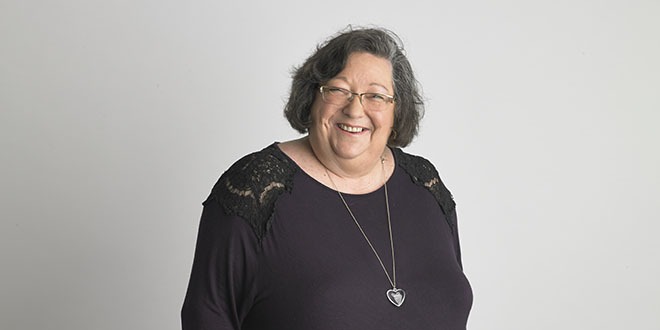Canadians with type 2 diabetes write back to their younger selves, to share personal insights and reflect on their experience of living with diabetes and starting on insulin therapy. In this post, Charlene reflects on living with diabetes.
Imagine regularly waking up in the middle of the night confused and disoriented, holding a juice box in your hand. This is Charlene’s experience at least twice a month, when she suffers through an episode of hypoglycemia.
“I live alone. I have everything I need on my bedside table to help manage hypoglycemia, but when my blood sugars drop to potentially dangerous levels I am so confused and disoriented that I get up and I lurch toward the kitchen,” she explains. “So now I load the kitchen up with juice boxes… which means I have to put that little straw in the box while feeling totally out of it!” She usually wakes up with the refrigerator door open and a juice box in her hand.
She hasn’t exactly gotten used to severe hypoglycemia, but she knows she can live with it. A gregarious 63-year-old who lives in Ontario, Canada, Charlene walks with a cane due to neuropathy, a long-term complication from diabetes meaning that she has little sensation in her feet. But she swims laps four evenings a week and is 50 pounds lighter compared to what she weighed five years ago. She’s also become a fervent advocate for effective, affordable diabetes medication, often speaking at Diabetes Canada events. In 2018 the organization presented her with the Inspirational Award for Ontario.
No one would have predicted this role for her, least of all Charlene. When she was diagnosed at age 19, she was given no medication and no instruction. No one among her family or friends ever mentioned it. “It was something you didn’t discuss, a taboo subject. Sometimes, in the early years when I tried to talk about it and find out if anyone else had diabetes, it was shameful, like I was talking about a sexually transmitted disease,” she remembers.
Over the years, while raising three daughters, she has confronted a host of personal and health challenges, including divorce, two bouts of cancer and many surgeries. But the most soul-crushing moment came five years ago, when she was in her endocrinologist’s office trying to find a diabetes treatment she could afford. In frustration, the doctor dismissed Charlene, saying she could do nothing more for her.
Charlene just looked at her and said: “You’re kidding…?”
Charlene went to her car and sat in it, tears streaming down her face. “On my way home, through the tears I wondered, what do I do now? I have endured so much but these words were the worst I had ever heard,” Charlene says. She wondered: is there nothing or no one that can help?
Here is her letter written to herself at this moment of despair, when she felt she was being told that she no longer mattered.
Dear ‘Charles’,
I know over the years you really didn’t think too much about this diabetes thing, and that you let it go because you really didn’t think it would make that much of a difference. Well, it does.
If I can say anything to you, Charles, it would be to be more aware of your body and yourself. Learn its rhythm and nuances. Know who and what you are. Begin to recognize your native part; your grandmother’s Algonquin heritage has played a big role in your experience with diabetes. It was considered a weakness that no one in your family wanted to admit to.
So, it was easy to ignore. That being said, I want you to know that you are forgiven. For the late nights, the extra bag of potato chips, the neglect of yourself and most of all for the lack of self-love.
Forgiven, because what you have done or what you have not done has made you the person you are today.
And, Charles, the amazing thing about this devastating experience is that it will produce an epiphany. You do matter. Your thoughts and experiences have value.
When you get home there will be a phone call from one of your nurse practitioners who will help you get referred to a complex care centre, which will support not only your physical health, but your financial and emotional well-being as well.
As you try to learn everything you can about diabetes, vindicate yourself. Try to put yourself first on occasion and, if you can, ignore your family’s negative attitude about diabetes. It is their problem. Be strong. Be positive. Diabetes is not a character flaw. You will speak openly to your physician about nighttime hypoglycemia and learn how to effectively manage it by modifying your treatment plan.
In fact, from this moment will come a brand new, unexpected opportunity to speak – and to be heard. You will help the complex care centre, and other people with diabetes, by giving inspiring speeches. Your self-esteem, which has been squashed by so many setbacks, will start to grow and bloom.
And from that moment, later in your life, you will understand your true purpose. You will start a whole new life chapter. Remember, be strong. Be true to yourself. Diabetes is not who you are, but merely an expression of your life.
You are worthy,
Charlene
This story has been edited by Ellyn Spragins and shared with support from Novo Nordisk Canada. The views and opinions expressed are not representative of Novo Nordisk, and should not be considered treatment advice. Novo Nordisk has permission to share this letter and included personal details.
 Diabetes Care Community Learn, connect and care
Diabetes Care Community Learn, connect and care





